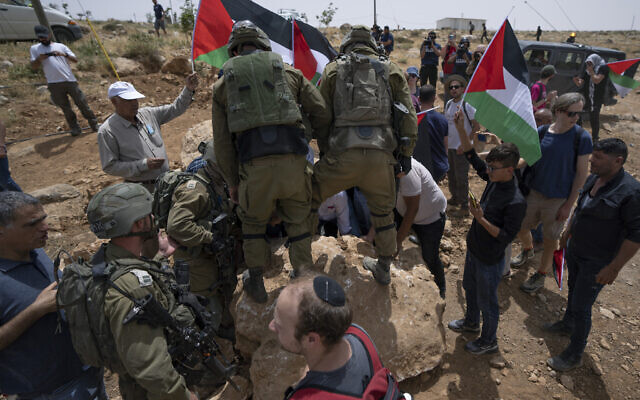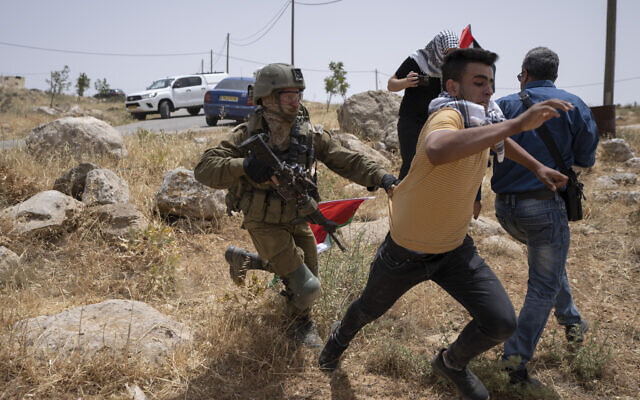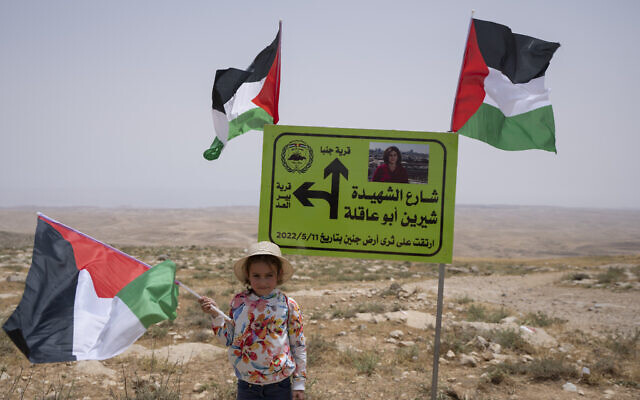Envoy to UN raises concern at UNSC, 83 Dems write to Blinken asking US to intervene after court okays plan to evict 1,300 Palestinians from Masafer Yatta to build IDF training zone

WASHINGTON — US Ambassador to the UN Linda Thomas-Greenfield and 83 Democratic lawmakers from both houses of Congress expressed alarm on Thursday over Israeli plans to evict roughly 1,300 Palestinians from the South Hebron Hills in the West Bank in order to make way for a military training zone.
Thomas-Greenfield raised the issue in her remarks during the monthly Security Council session on the Israeli-Palestinian conflict, while 20 senators and 63 representatives penned a letter to US Secretary of State Antony Blinken urging him to intervene as US President Joe Biden prepares to visit Israel and the West Bank next month.
The decisions to weigh in came three weeks after Israel’s High Court of Justice ruled that Israel could move forward with the evictions in an area known as Masafer Yatta where at least eight Bedouin hamlets are located.
Justice David Mintz wrote in his ruling that the Palestinian petitioners had not successfully proved they had lived in the villages as permanent residents before the army declared the area a training zone in the early 1980s.
The Palestinians have maintained that their presence in the villages goes back decades. The Israeli army, by contrast, argued that they had occasionally entered the area during seasonal migration — meaning they had no rights to the land.
“It is important to refrain from unilateral actions that exacerbate tensions and jeopardize a negotiated two-state solution. This includes the situation in Masafer Yatta and other evictions, which we continue to monitor closely and voice our concerns about,” Thomas-Greenfield told the Security Council, becoming the first Biden official to specifically weigh in on the slated South Hebron Hills evictions.

The UN’s Special Envoy for the Middle East Peace Process Tor Wennesland also brought up Masafer Yatta at the Security Council session, saying “I am deeply concerned by the potential implications of the High Court’s ruling and the humanitarian toll on the communities in question if evictions orders are carried out.”
In their letter to Blinken, led by Sen. Jeff Merkley and Rep. Melanie Stansbury, the Democratic lawmakers wrote that “such evictions undermine our shared democratic values, imperil Israel’s security, and disregard Palestinian human and civil rights.”
“We respectfully request that you immediately engage with the Israeli government to prevent these evictions and further military training exercises in the area,” the lawmakers added, saying Israel should approve master plans for the villages in Masafer Yatta so that the residents can maintain their homes. “With President Biden visiting Israel in late June, it is critical that the Administration respond quickly to ensure that this momentous trip can deliver concrete steps toward peace.”
The letter was signed by dozens of progressive Democrats but also received support from lawmakers who rarely criticize Israeli actions in the West Bank including Sens. Amy Klobuchar, Dick Durbin and Rep. Jake Auchincloss.
The European Union has also condemned the ruling, saying that “settlement expansion, demolitions, and evictions are illegal under international law.”
For more than two decades, the Israeli military, Palestinians, and rights groups have wrangled over the legality of expelling the Palestinians living within the firing zone, known as Zone 918.

Palestinians in Zone 918 have lived precarious lives in the meantime. With almost all construction illegal, Israeli authorities regularly tore up houses, electrical cables, and pipes intended to bring water to the hilltop villages
The Israeli military proposed a compromise in which Masafer Yatta residents would be allowed to return to cultivate the land and herd livestock on weekends and Jewish holidays when the army is not conducting drills, but this proposal was rejected by the Palestinians.
Justice Mintz also dismissed the Palestinians’ argument that mass eviction would violate a widely held prohibition against population transfer in international law. Mintz ruled the ban sought to prevent atrocities such as genocide and thus had “nothing, absolutely nothing, to do with the issue before us.” Mintz is a resident of the central West Bank settlement of Dolev.
The Israeli army argues the firing zone is essential for military training due to its “distinctive geographic features.” In February 2021, Israeli tanks rolled through several of the villages as part of a military exercise.
But archival documents from the early years of Israeli rule in the West Bank suggest that the motivation for declaring local firing zones may have been political rather than technical. In a 1981 meeting of the government’s Settlement Committee, future prime minister Ariel Sharon said firing zones in the South Hebron Hills were necessary to ensure the area remained in Israeli hands.
As reported by The Times of Israel
